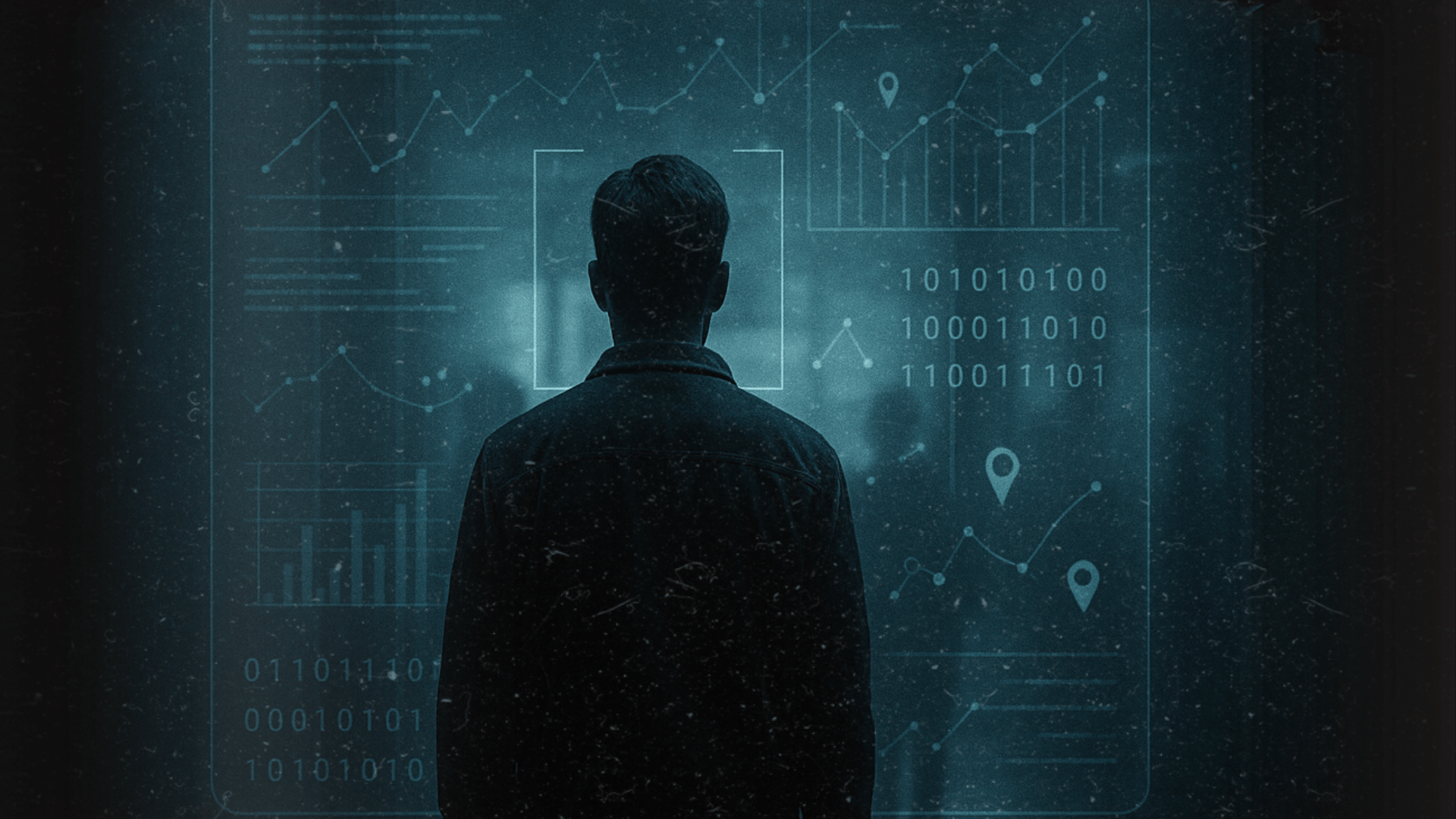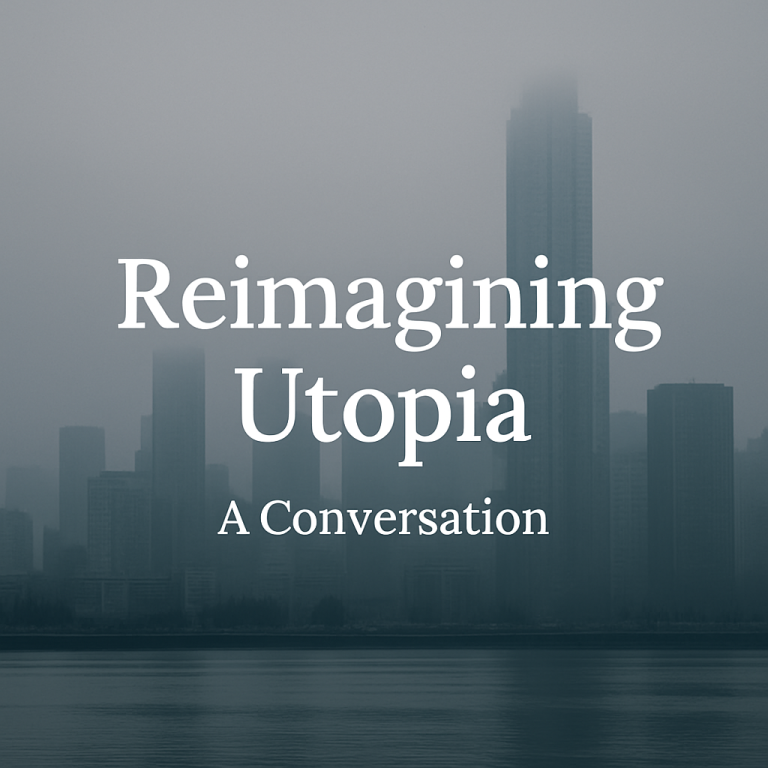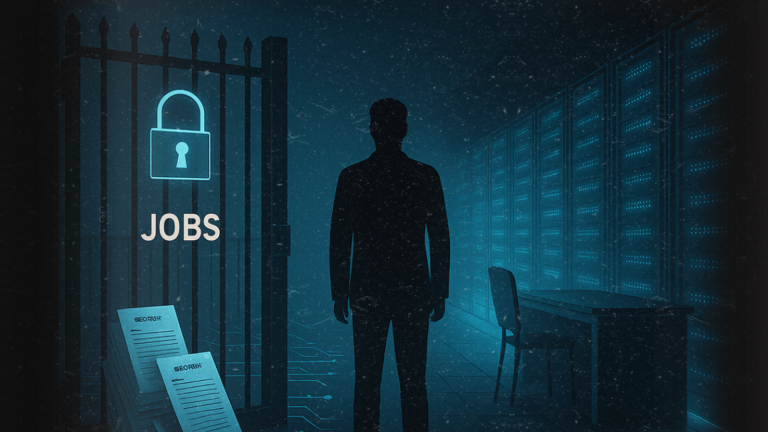The Prediction Trap: When Connection Becomes Control
How Surveillance Culture Redefined Belonging, Privacy, and the Human Need to Be Seen
This essay continues the ideas explored in Beyond Replacement: Why the Future Belongs to Centaurs and expands on themes introduced in The Prediction Engine and The Price of Belonging — the first two episodes of Season 2 of The Xenessa Project.
The Quiet Exchange
It begins innocently. You open an app, join a fitness group, or scroll through a news feed. The interface smiles back. It’s personalized, responsive, and familiar. But in that moment, a trade is made. You offer data: clicks, location, patterns, habits, emotions. In return, you receive connection…or at least, that’s the promise. Beneath every smooth interaction, this exchange turns the prediction trap of connection into a subtle form of control.
We used to think surveillance meant cameras on corners or governments peering through windows. Now it’s something gentler and far more intimate. The system doesn’t just watch, it predicts. And when prediction couples with control, it becomes the most powerful form of influence we’ve ever created.
That said, predictive technology isn’t all downside. It offers real benefits, like streamlined navigation on GPS apps or tailored recommendations that save time. But when these conveniences come at the cost of unchecked data collection, the balance shifts toward control.
Life After 1984
In 1984, George Orwell envisioned a single, omnipresent eye, which he called “Big Brother,” always watching from a telescreen. Today’s version is much more elegant. Instead of one eye, we built thousands.
Phones, smart speakers, doorbells, watches; each collecting fragments of our daily lives. At first glance, it appears convenient, rather than dystopian. Yet, as sociologist Shoshana Zuboff warns in The Age of Surveillance Capitalism, this convenience hides a cost. What we call personalization is often behavioral extraction, capturing human experience to predict and shape our next moves.
Your streaming service senses your moods. Your GPS predicts your destination before you type. Your browser finishes your thoughts mid-sentence.
Amazon’s Ring network, now linked with over 2,500 local government agencies, forms one of the largest civilian surveillance systems in history. That network joins a much wider ecosystem: Top10VPN’s global analysis has mapped more than 6.3 million IP-connected surveillance cameras from major manufacturers like Hikvision and Dahua across cities worldwide. Together, these systems amplify the reach of everyday observation far beyond Orwell’s telescreen, connecting millions of quiet lenses into one vast, always-on infrastructure.
Globally, surveillance varies. In China, a combination of state monitoring and private data systems has evolved into a vast network of predictive governance. Local “blacklist” programs under the country’s social credit pilots have restricted access to airline tickets, loans, and educational opportunities for citizens labeled as untrustworthy. Private systems such as Zhima Credit, run by Ant Group, extend similar scoring logic into the commercial sphere, merging financial, behavioral, and social data to determine eligibility and risk. Together, these systems demonstrate how predictive technologies can blur the line between policy enforcement and everyday life.
The Prediction Engine
This goes beyond surveillance—it’s forecasting. Every action becomes a data point in a machine trained to anticipate your next move. Tech companies call it “proactive engagement.” Economists label it “behavioral surplus.” Psychologists might see learned manipulation.
Shoshana Zuboff terms this instrumentarian power: a subtle influence that modifies behavior without force. The algorithm doesn’t coerce—it arranges choices to make one path feel easier.
And that’s the point. Control no longer needs chains; it thrives on convenience. Some argue this trade-off is worthwhile. But when convenience silently shapes our opportunities, relationships, and self-perception, we must ask: convenient for whom?
A 2015 PNAS study by Youyou, Wu, and Kosinski showed that Facebook’s algorithms could infer personality traits, political leanings, and even sexual orientation with greater accuracy than a person’s close friends or family.
Research from University of Oxford shows that most mobile apps embed third-party trackers, enabling extensive cross-service profiling and data sharing across the app ecosystem. Apple’s App Tracking Transparency feature blocked over 1.5 trillion tracking attempts in its first year. The scale reveals the truth: prediction drives the modern web’s business model.
The Belonging Bargain
Last month, I joined a fitness app to stay motivated. Within days, my workouts became marketing profiles. Suddenly, protein ads, supplement deals, and unrequested challenges flooded in. To participate, I had to share my life.
That’s the new social contract: to belong, you must be known. To be known, you must be tracked.
We explored this dynamic more deeply in The Price of Belonging — an episode about how privacy and data have become the hidden costs of community. The pattern is clear: what feels like connection often begins as surveillance.
A 2023 Pew Research Center survey found that 73% of Americans feel they have little to no control over the data collected about them. Opting out feels impossible. Connection, community, visibility, and relevance now hide behind a privacy tollgate.
Consumer Reports’ Digital Lab discovered community and lifestyle apps share data with third-party brokers, merging it with purchase histories, social graphs, and public records. This creates a marketplace of selves, where routines are auctioned for predictive value.
We think we’re logging in. But, in truth, we’re checking in to a system that never logs out.
To reclaim some control, start by auditing your apps: review permissions and disable unnecessary access to location or contacts. This simple step reduces data exposure without disconnecting you entirely.
The Human Cost: When Help Becomes a Label
This Belonging Bargain cuts deep, often unnoticed until it’s too late.
Take David, a 34-year-old teacher enduring a brutal semester. One night, completely drained, he googled “signs of teacher burnout”. It was a private moment of doubt. Hours later, his phone pushed ads for therapy apps, stress-relief gadgets, and high-risk life insurance with taglines like “Secure your future now.” His YouTube feed suggested “leaving teaching behind.”
“I felt like the internet decided I was broken and started selling me a whole new life,” he said.
Fearing an insurance flag or school scrutiny, he stopped seeking help, not even telling his doctor. The fear of labeling silenced him.
But the pattern doesn’t stop with individual searches. What begins as a private question often expands into professional or social exclusion.
The Human Cost: When Community Turns Gatekeeper
Jamal, a freelance designer, joined a gig platform that rewarded participation, hoping to build a supportive community. After a few slow months, his profile was flagged as “low engagement.” Suddenly, job offers dwindled, and clients stopped picking him. He later learned the platform’s algorithm had downgraded him based on his data, labeling him “unreliable” due to fewer completed gigs. His once-welcoming community turned into a gatekeeper, shutting him out without warning.
His story reveals how the very tools built to connect us can quietly decide who deserves opportunity.
The Human Cost: When Visibility Defines Worth
Meanwhile, the effect extends to personal spheres as well.
Gina, a mom, joined a school-parenting app to stay connected to her kid’s events, seeing it as a lifeline with schedules, chats, and volunteer sign-ups. But she noticed some parents received exclusive invites to school committees while she didn’t. The app tracked engagement, and because she didn’t post often or attend every event, she was labeled “disengaged.” She told me,
“I just wanted to be part of my kid’s school. Now I feel like I failed because I didn’t share enough.”
Across different settings, the pattern remains the same: engagement metrics replace empathy.
The Human Cost: When Privacy Becomes Risk
Even personal crises can become public targets. Elena, after a pregnancy scare, googled “abortion clinics near me.” Days later, she was bombarded with ads from baby-product brands and anti-abortion groups across her devices. In some states, such search histories can be subpoenaed, turning a private moment into a legal risk. She said,
“I felt hunted by my own fear,”
and the intrusion made her hesitant to search freely again.
These personal stories point to a larger reality: when prediction becomes policy, belonging turns conditional. The system doesn’t reject you outright; it simply withholds what you never realize you lost.
Beyond individuals, groups feel the ripple: dynamic pricing adjusts concert tickets by browsing history, job platforms down-rank “risky” candidates, and dating/fitness apps share sensitive data 20% more than others. Personalization often masks quiet exclusion, where “yes” depends on data alignment.
Have you ever felt tracked by an app or had your data shape opportunities? Share your experience in the comments below!
When Fear Becomes Silence
The greatest danger of surveillance isn’t exposure, it’s restraint.
When people begin censoring their own searches, questions, or emotions for fear of how data might be used, we enter what philosophers call the chilling effect. Expression narrows. Imagination shrinks.
That’s the emotional tax of the prediction age: the more we try to protect ourselves, the less we participate. Privacy erodes connection; connection erodes privacy. Either way, we lose part of our freedom to simply wonder without consequence.
What the Research Reveals
The data confirms this spiral.
- According to Mordor Intelligence, the global data broker market is valued at approximately USD 294 billion in 2025 and is projected to reach around USD 420 billion by 2030, growing at a compound annual rate of 7.36%. The steady climb reflects how personal information has become one of the fastest-growing commodities in the global economy. It’s traded, analyzed, and monetized by countless third-party brokers.
- A large-scale study of Android devices found that 87.2 percent of smartphones transmit private information to at least five different domains, revealing how deeply third-party tracking and data sharing are embedded in everyday mobile use. (Understanding Worldwide Private Information Collection on Android, 2021)
- In Europe, enforcement of the General Data Protection Regulation (GDPR) has resulted in more than €5.65 billion in fines since 2018, marking one of the world’s most aggressive frameworks for regulating corporate data collection. (enforcementtracker.com)
To visualize the scale, here’s a chart showing the growth of the global data-broker market:
Mordor Intelligence Research & Advisory. (2025 , June). Data Broker Market Size & Share Analysis – Growth Trends & Forecasts (2025 – 2030). Mordor Intelligence. Retrieved October 6, 2025, from https://www.mordorintelligence.com/industry-reports/data-broker-market
Technology that began as a mirror has become a map. And the map now directs the traveler.
Reclaiming Agency in a Predictive World
So what does it mean to reclaim autonomy when algorithms anticipate your every move? It doesn’t require vanishing offline. It requires intention.
- Audit your digital life. Review what your favorite apps can access, such as location, contacts, and microphone. Disable what isn’t essential. Go into your phone’s settings and prune unnecessary permissions. This is digital hygiene, not paranoia.
- Switch your defaults. Use privacy-respecting tools: Signal for messaging, DuckDuckGo for search, Brave for browsing. Let your behavior signal demand for ethical design.
- Choose transparency over “free.” Free isn’t free. The real cost often hides in your data, not your wallet. Look for platforms that clearly outline their business model and respect you as a participant, not a product.
- Support the defenders. Groups like the Electronic Frontier Foundation and Fight for the Future lobby for stronger privacy laws. Even a small donation or share amplifies the movement.
- Bring connection back to reality. Host a dinner, start a book circle, write a letter. The slow forms of belonging remind us what can’t be mined or monetized. Every small act of resistance, every refusal to feed the prediction engine, is a vote for human unpredictability.
The Human Signal Beneath the Noise
The prediction trap thrives on routine. It wants us to act, think, and buy predictably so it can keep making accurate predictions. But unpredictability is the essence of being human.
To live freely in a data-driven world is to reclaim surprise. To let yourself be unmeasured. To hold a thought privately until you’re ready to share it.
Before you post, scroll, or “accept all,” pause for one quiet question: Who benefits from this version of me?
Because your data is not just numbers, it’s narrative. And if you don’t own your story, someone else will write it for you.
Looking Ahead
Next in Season 2: The Xenessa Project continues to explore Digital Culture and Human Resilience with “The Collapse of Language“—how our words, shortened and compressed into memes and emojis, are changing not just how we communicate, but also how we think. Subscribe to catch next week’s post and join the conversation on reclaiming your digital autonomy.
Sources & Further Reading
- Shoshana Zuboff, The Age of Surveillance Capitalism (2019)
- Pew Research Center (2023) — Public Attitudes Toward Data Privacy
- University of Oxford (2018) — Third Party Tracking in the Mobile Ecosystem (ORA)
- Consumer Reports Digital Lab (2022) — Reproductive Health Apps: A Digital Standard Case Study
- Mordor Intelligence (2025) — Data Broker Market Forecast 2025–2030
- Top10VPN (2024) — Hikvision and Dahua Surveillance Cameras: Global Locations
- Youyou, Wu, & Kosinski (2015) — Computer-Based Personality Judgments Are More Accurate Than Those Made by Humans. Proceedings of the National Academy of Sciences (PNAS)
- Reardon, J., Wijesekera, P., & Egelman, S. (2021) — Understanding Worldwide Private Information Collection on Android
- Trauth-Goik, A., et al. (2023) — The Power and Limits of the Social Credit Blacklist System in China
- Logic Magazine (2020) — The Messy Truth About Social Credit
- Zhima Credit (Wikipedia, 2024) — Zhima Credit / Sesame Credit Overview
- CMS Law (2024) — GDPR Enforcement Tracker: Total Fines Since 2018






Downloading the 9080betapp now. Hope the mobile experience is smooth. Ain’t got time for clunky apps. Fingers crossed! 9080betapp
Looking for a reliable Sv388 link? Sv388link seems legit. Got me where I needed to go without any hassle. If you need it, here it is: sv388link
https://shorturl.fm/A8jKD
Fast indexing of website pages and backlinks on Google https://is.gd/r7kPlC
Hello https://is.gd/tvHMGJ
Sign up and turn your connections into cash—join our affiliate program!
Refer customers, collect commissions—join our affiliate program!
Earn recurring commissions with each referral—enroll today!
Skip months of hard work and launch a high-converting AI business today using this professionally designed “Business In A Box”. With full Private Label Rights, you can rebrand these expert assets as your own and keep 100% of the profits from every sale.
https://www.youtube.com/watch?v=ksq5cZApb3E
Automate your income with our AI system that generates all your content for you, delivering up to $3,000 monthly without the need for selling or hiring. Simply post ready-made materials to a unique platform with free lifetime traffic and receive direct payments while the system does all the heavy lifting for you.
https://www.youtube.com/watch?v=yy-jNgaxPbs